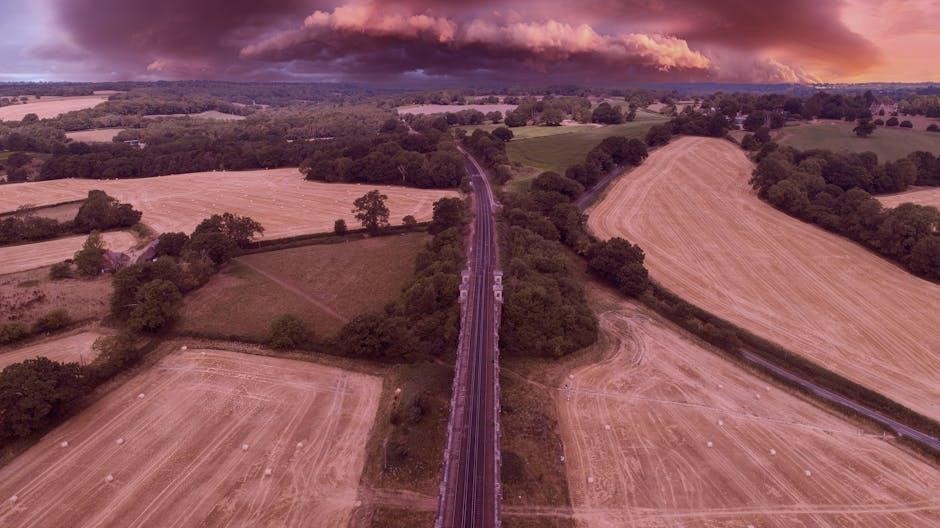“This is Water” by David Foster Wallace is a renowned commencement speech delivered at Kenyon College in 2005, emphasizing awareness, empathy, and perspective in daily life, now widely available as a PDF․
Title and Author
The speech is titled “This is Water” and was delivered by the renowned American author and philosopher David Foster Wallace․ Wallace, known for his insightful and deeply philosophical writings, crafted this commencement address to emphasize the importance of awareness, empathy, and perspective in everyday life․ The speech, which has gained widespread acclaim, was first delivered at Kenyon College in 2005 and has since been widely circulated in various formats, including PDF․ Its enduring popularity stems from its universal themes and Wallace’s unique ability to connect abstract ideas to mundane experiences, making it a timeless resource for reflection and personal growth; The title itself, “This is Water”, reflects the central metaphor of the speech, urging listeners to recognize the obvious yet often overlooked aspects of life․ Wallace’s work continues to resonate with readers seeking meaning and connection in a complex world․
Publication Details

The commencement speech “This is Water” by David Foster Wallace was delivered on May 21, 2005, at Kenyon College․ The speech gained widespread acclaim for its thought-provoking content and has since been published in various formats, including a PDF version that is widely available online․ It was initially released as a transcript of the speech, but its popularity led to its distribution in downloadable formats, making it accessible to a global audience․ The speech has been praised for its ability to transcend the academic setting, offering insights into everyday life․ Over the years, it has become a key work in Wallace’s legacy, resonating with readers for its universal themes of awareness, empathy, and the human condition․ Its availability as a PDF has further cemented its place as a modern philosophical text․
Overview of the Speech
“This is Water” is a profound commencement speech delivered by David Foster Wallace at Kenyon College in 2005․ The speech revolves around the idea of cultivating awareness and empathy in everyday life․ Wallace uses the metaphor of water to illustrate how our surroundings and experiences shape our perceptions, often without us realizing it․ He challenges graduates to move beyond their default ways of thinking and to recognize the importance of choice in how they engage with the world․ The speech emphasizes that true freedom lies in the ability to consciously choose how we respond to life’s mundane and challenging situations․ By encouraging mindfulness and understanding, Wallace offers a timeless message about living a meaningful and compassionate life․ The speech has resonated widely, making it a significant work in contemporary philosophy and personal reflection․

Background
“This is Water” is a commencement speech delivered by David Foster Wallace at Kenyon College in 2005, addressing graduates on life’s deeper truths and existential awareness․
The Occasion: Kenyon College Commencement
David Foster Wallace delivered “This is Water” at Kenyon College’s 2005 commencement, a speech that transcended traditional graduation themes, focusing on existential truths and daily life awareness․

Historical Context: 2005 Graduation
The 2005 graduation ceremony at Kenyon College marked a pivotal moment for the class of 2005, a time of transition and reflection․ Delivered on May 21, 2005, David Foster Wallace’s speech, “This is Water,” resonated deeply with the graduating class and beyond․ The early 2000s were a period of heightened global awareness, with events like the Iraq War and the rise of digital technology shaping the cultural landscape․ Wallace’s address, however, shifted focus inward, urging graduates to embrace awareness and empathy in their daily lives․ The speech’s themes of existential truth and the importance of perspective struck a chord, making it a defining moment in commencement history․ Its relevance endures, with the speech available as a PDF for wider audiences to reflect on its timeless wisdom․
Reception and Impact
“This is Water” by David Foster Wallace was met with widespread acclaim upon its delivery in 2005․ The speech’s heartfelt message about awareness, empathy, and the realities of life resonated deeply with both the graduating class and the broader public․ Its impact grew exponentially as it spread online, becoming one of the most-shared commencement speeches in history․ The speech’s themes of mindfulness and interconnectedness struck a universal chord, leading to its publication and distribution in various formats, including PDF․ Its influence extended beyond academia, inspiring readers to reevaluate their daily interactions and perspectives․ The speech solidified Wallace’s reputation as a profound thinker and continues to be celebrated for its timeless wisdom and emotional depth․ Its availability as a PDF has ensured its accessibility, making it a cherished resource for those seeking meaningful insights into life’s complexities․
Core Message
“This is Water” emphasizes the importance of awareness, empathy, and freedom through conscious choice, urging individuals to transform mundane experiences into opportunities for connection and meaning in life․
The Importance of Awareness and Perspective
In “This is Water”, David Foster Wallace underscores the transformative power of awareness and perspective in navigating life’s mundane and challenging moments․ He illustrates this through the metaphor of two young fish encountering an older fish who simply says, “This is water,” highlighting the often-overlooked truth of our surroundings․ Wallace argues that true freedom lies in choosing how to perceive and interpret experiences, rather than being controlled by default reactions․ He emphasizes that education should cultivate not just intellectual capacity but also the ability to see beyond oneself․ By fostering awareness, individuals can transcend self-centeredness and embrace empathy, transforming routine interactions into opportunities for connection and understanding․ This message encourages graduates—and readers—to approach life with intentionality and mindfulness, recognizing the profound implications of their daily choices and perspectives․
The Role of Empathy in Daily Life
David Foster Wallace’s “This is Water” profoundly explores the role of empathy in daily life, urging individuals to move beyond self-absorption․ He argues that empathy is not merely a feeling but a conscious choice, essential for meaningful human connection․ Wallace uses the example of mundane experiences, such as driving in traffic or grocery shopping, to illustrate how empathy can transform frustration into understanding․ By recognizing that others, like ourselves, are dealing with their own struggles, we can choose to respond with compassion rather than irritation․ This shift in perspective, Wallace contends, is a fundamental aspect of living a compassionate and authentic life․ Empathy, in this context, becomes a powerful tool for breaking down the walls of isolation and fostering a sense of community and shared humanity in our everyday interactions․ This idea is central to Wallace’s vision of a more mindful and connected world․
Freedom Through Choice and Consciousness
David Foster Wallace’s “This is Water” emphasizes that true freedom lies in our ability to choose how we perceive and respond to life’s challenges․ Wallace argues that our default setting is to see the world through a self-centered lens, but this limits us․ By becoming aware of this tendency, we gain the freedom to make conscious choices․ He illustrates this with everyday scenarios, such as being stuck in traffic or waiting in line, where we can choose to react with frustration or with empathy․ Wallace suggests that this awareness is a form of liberation, allowing us to move beyond our ego-driven reactions and connect with others on a deeper level․ Ultimately, he posits that freedom is not about escaping life’s difficulties but about embracing the power to choose our perspective and response, thereby living more authentically and compassionately․ This idea is central to his vision of a more mindful and liberated existence․
Key Themes
“This is Water” explores themes of awareness, empathy, and freedom, urging graduates to move beyond self-centeredness and embrace the transformative power of conscious choice in everyday life․
The Purpose of Education Beyond Academic Achievement
David Foster Wallace’s speech highlights that education extends far beyond mere academic success․ He emphasizes the development of critical thinking, moral reasoning, and emotional intelligence․ Wallace argues that true education should cultivate awareness, enabling individuals to transcend self-centeredness and embrace empathy․ By fostering a deeper understanding of life’s complexities, education prepares graduates to navigate challenges with compassion and perspective․ Wallace’s insights encourage a shift from intellectual arrogance to genuine curiosity, promoting a lifelong pursuit of wisdom and personal growth․ This perspective reshapes the role of education, making it a tool for meaningful connection and conscious living rather than just professional advancement․
The Illusion of Control and the Reality of Interdependence
Wallace challenges the notion of individual control, asserting that our lives are deeply intertwined with others․ He illustrates how we often overlook this interdependence, clinging to the illusion of autonomy․ By acknowledging the reality of interconnectedness, Wallace encourages a shift in perspective․ He emphasizes that true freedom lies in recognizing how our choices and actions impact others․ This understanding fosters empathy and responsibility, revealing that no one exists in isolation․ Wallace’s message underscores the importance of humility and cooperation, urging individuals to embrace their role within the larger community․ This theme encourages graduates to move beyond self-centeredness, fostering a sense of shared humanity and mutual support in navigating life’s challenges․
The Power of Mindfulness in Routine Activities
Wallace highlights the transformative potential of mindfulness in everyday routines, urging individuals to transcend mundane tasks by infusing them with purpose․ He uses the metaphor of water to illustrate how the ordinary can become extraordinary through conscious awareness․ By paying attention to our thoughts and reactions, even in tedious situations, we can cultivate a deeper understanding of ourselves and others; Wallace argues that mindfulness is not just a practice but a way of life, enabling us to find meaning and connection in the most ordinary moments․ This perspective encourages graduates to approach life with intentionality, turning routine activities into opportunities for growth and self-reflection․ Ultimately, Wallace’s emphasis on mindfulness challenges individuals to reframe their experiences, finding significance in the everyday and fostering a more compassionate existence․

Leave a Reply
You must be logged in to post a comment.